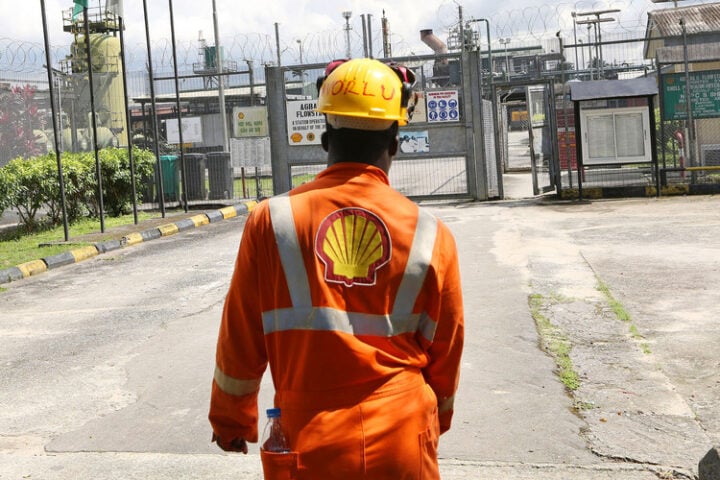In the wake of Shell’s decision to end its onshore exploration business in Nigeria, several social media posts have alleged that the British oil giant is exiting the country.
Reacting to Shell’s announcement, some Nigerians on social media commented with varying, and sometimes inaccurate, remarks.
Some of the posts, attracting thousands of likes and retweets on X, asserted that Shell has closed the curtain on its over 80 years of operations in the country.
“Shell just announced they are leaving Nigeria. What is this white people seeing that we are not seeing yet?” an X user, @Naija_Activist, tweeted.
Advertisement
Another user, @_pheranme, also made a post about the purported exit of Shell, asking: “What is happening in Nigeria?”
For X user @ThisIsNot1967_, the claim was that “Shell BP exits sinking Nigeria after 85 years operations”.
Shell just announced they leaving Nigeria. What is this white people seeing that we are not seeing yet?
Advertisement— Dr Yusuf Datti Baba-Ahmed (STAN) #ObiDatti2023 (@Naija_Activist) January 16, 2024
Shell oil company is leaving Nigeria. What is happening to this country? pic.twitter.com/rZlGpwFGnb
— Feranmi (@_pheranme) January 16, 2024
If Shell is running from Nigeria, just know the end is here! 🙆🏾♂️ https://t.co/Ub24iwHL7d
Advertisement— Emir Sirdam (@EmirSirdam) January 16, 2024
Shell BP exits sinking Nigeria after 85 years operations. pic.twitter.com/lvQ4t7Gyww
— IK£MBA☄️🌄🇸🇩🇿🇦🇷🇺☄️ (@ThisIsNot1967_) January 16, 2024
Advertisement
Ladies and gentlemen that’s the End of Shell in Nigeria.
They could not compete with the new Dangote Refinery so they had to leave after staying in Nigeria for 65 years https://t.co/Yj1KjrEpuv
AdvertisementThe @UKinNigeria/Dutch racist and imperialist enterprise, Shell BP is leaving their slave camp, Nigeria.
Shell has sponsored various atrocities including the manipulation of Nigeria’s politics to entrench corruption and Fulani hegemony.
AdvertisementNow they’re leaving. I get the message. pic.twitter.com/GY9Kzic9iX
— An Uncle named Chike (@Unclechike1) January 16, 2024
AdvertisementShell, the oppressor company quits Nigeria, making it 8 multinational mega companies that Left Nigeria recently.
Alot is happening believe me.
Biafra must be free.#FreeBiafra pic.twitter.com/dwxGlGcGqk
— Emeka Gift Official (@EmekaGift100) January 16, 2024
— Niger Delta (@Franeb) January 16, 2024
SORTING FACTS FROM THE CHATTER
While announcing the changes in its Nigerian business structure, the company said, subject to following regulatory approvals, it would sell Shell Petroleum Development Company of Nigeria Limited (SPDC).
The onshore business is to be acquired by Renaissance — a consortium of five companies comprising four exploration and production companies based in Nigeria and an international energy group. The companies are ND Western, Aradel Energy, First Exploration and Production (First E&P), Waltersmith, and Petrolin.
The SPDC is the operator of the NNPC/SPDC/Total Energies/NAOC joint venture, which comprises Nigerian National Petroleum Company Limited (55 percent holding), SPDC (30 percent), Total Energies (10 percent), and the Nigerian Agip Oil Company Limited (5 percent).
In a statement issued on its onshore withdrawal, Shell clarified that the sale of one of its Nigerian subsidiaries does not imply an exit, explaining that it still has “three other main businesses” in the country.
The energy firm listed the businesses as Shell Nigeria Exploration and Production Company Limited (SNEPCo), Shell Nigeria Gas Limited (SNG), and Daystar Power Group, which provides integrated solar power to commercial and industrial businesses across West Africa.
“In addition, Shell holds a 25.6% interest in NLNG, which produces and exports LNG to global markets. Shell’s interest in NLNG is also outside the scope of this transaction,” the statement reads.
SHELL STILL DOING BUSINESS IN NIGERIA
SNEPCo, which pioneered deep-water oil and gas production from the Bonga field in the Gulf of Guinea, is expected to continue its production and exploration activities.
Also, Daystar, which was acquired by Shell in December 2022, will continue to maintain its presence in Nigeria.
Similarly, SNG, which currently operates a growing gas transmission and distribution network of over 138km in Nigeria, would still be present in the country.
REASONS BEHIND SHELL’S ONSHORE EXIT
Shell’s intention to sell its onshore subsidiary has been long envisaged, with the company grappling with oil spills due to theft, sabotage, and operational issues, resulting in costly repairs and high-profile lawsuits.
The lawsuits had deterred the company from selling its onshore assets before now.
During an annual general meeting in 2021, Ben van Beurden, former chief executive officer of Shell, said the oil giant was in talks with the federal government to sell its onshore oil assets, citing unprecedented sabotage.
In March 2022, a court of appeal in Owerri stopped Shell from selling any assets in Nigeria until a decision was reached on the company’s appeal of over $2 billion in penalties from alleged oil spills.
In July 2022, Shell paused the divestment of its onshore oil assets pending the outcome of the case at the supreme court.
MULTINATIONALS SELLING ONSHORE ASSETS
Some other international oil companies (IOCs) have also embarked on a sales spree.
In February 2022, Seplat Energy Plc agreed to acquire ExxonMobil’s entire share in its shallow water business — Mobil Producing Nigeria Unlimited (MPNU).
However, after over one year, the deal is yet to be completed due to regulatory encumbrances.
In April 2022, TotalEnergies announced plans to sell its minority stake in a Nigerian oil joint venture, joining other top firms divesting from onshore oilfields in the country.
Similarly, Oando, in September 2023, said it had signed a deal to acquire 100 percent of Eni’s shares in Nigerian Agip Oil Company Limited (NAOC Ltd).
Equinor, the Norwegian oil firm, in November 2023 said it had agreed to sell its Nigerian business, including the company’s stake in the Agbami oil field, to Chappal Energies, a Nigerian-owned firm.
VERDICT
The claim that oil giant Shell is leaving Nigeria is false. The company still retains ownership of three other subsidiaries.
Add a comment






